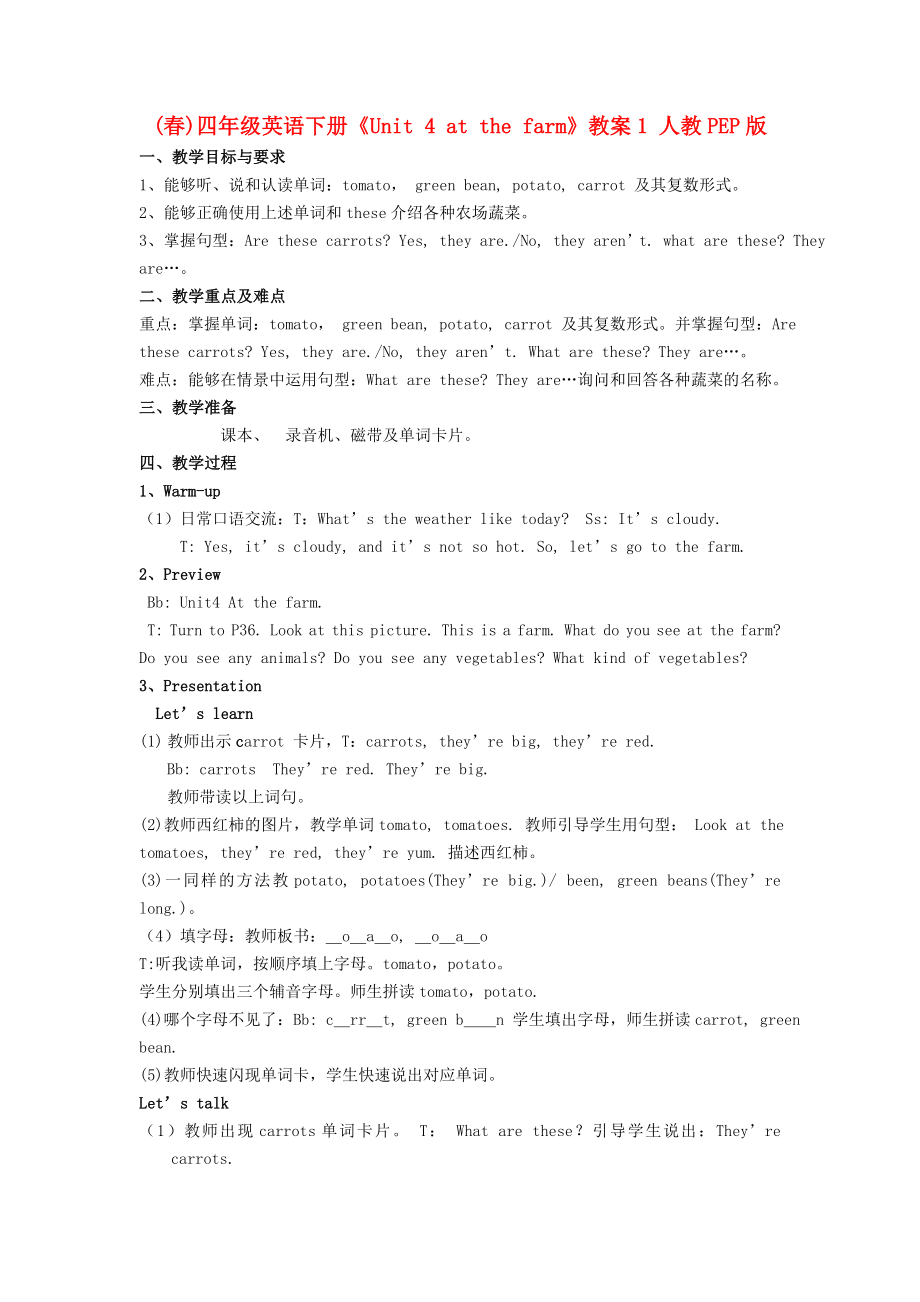《(春)四年級(jí)英語(yǔ)下冊(cè)《Unit 4 at the farm》教案1 人教PEP版》由會(huì)員分享,可在線閱讀�,更多相關(guān)《(春)四年級(jí)英語(yǔ)下冊(cè)《Unit 4 at the farm》教案1 人教PEP版(3頁(yè)珍藏版)》請(qǐng)?jiān)谘b配圖網(wǎng)上搜索��。
1���、(春)四年級(jí)英語(yǔ)下冊(cè)《Unit 4 at the farm》教案1 人教PEP版
一、教學(xué)目標(biāo)與要求
1����、能夠聽(tīng)��、說(shuō)和認(rèn)讀單詞:tomato, green bean, potato, carrot 及其復(fù)數(shù)形式��。
2�、能夠正確使用上述單詞和these介紹各種農(nóng)場(chǎng)蔬菜��。
3���、掌握句型:Are these carrots? Yes, they are./No, they aren’t. what are these? They are…�����。
二��、教學(xué)重點(diǎn)及難點(diǎn)
重點(diǎn):掌握單詞:tomato�, green bean, potato, carrot 及其復(fù)數(shù)形式�。并掌握句型:Are thes
2�、e carrots? Yes, they are./No, they aren’t. What are these? They are…。
難點(diǎn):能夠在情景中運(yùn)用句型:What are these? They are…詢(xún)問(wèn)和回答各種蔬菜的名稱(chēng)���。
三�����、教學(xué)準(zhǔn)備
?????課本�����、?錄音機(jī)���、磁帶及單詞卡片。
四����、教學(xué)過(guò)程
1����、Warm-up
(1)日?�?谡Z(yǔ)交流:T:What’s the weather like today? Ss: It’s cloudy.
T: Yes, it’s cloudy, and it’s not so hot. So, let’s go to
3、the farm.
2、Preview
Bb: Unit4 At the farm.
T: Turn to P36. Look at this picture. This is a farm. What do you see at the farm? Do you see any animals? Do you see any vegetables? What kind of vegetables?
3����、Presentation
Let’s learn
(1) 教師出示carrot 卡片����,T:carrots, they’re big, they’re red.
Bb: car
4����、rots They’re red. They’re big.
教師帶讀以上詞句。
(2)教師西紅柿的圖片��,教學(xué)單詞tomato, tomatoes. 教師引導(dǎo)學(xué)生用句型: Look at the tomatoes, they’re red, they’re yum. 描述西紅柿��。
(3)一同樣的方法教potato, potatoes(They’re big.)/ been, green beans(They’re long.)����。
(4)填字母:教師板書(shū):_o_a_o, _o_a_o
T:聽(tīng)我讀單詞,按順序填上字母����。tomato,potato���。
學(xué)生分別填出三個(gè)輔音字母��。師生
5�����、拼讀tomato�,potato.
(4)哪個(gè)字母不見(jiàn)了:Bb: c_rr_t, green b__n 學(xué)生填出字母��,師生拼讀carrot, green bean.
(5)教師快速閃現(xiàn)單詞卡����,學(xué)生快速說(shuō)出對(duì)應(yīng)單詞��。
Let’s talk
(1)教師出現(xiàn)carrots單詞卡片。 T: What are these�?引導(dǎo)學(xué)生說(shuō)出:They’re carrots.
Ss: What are these����?They’re carrots.
教師解釋these�,并帶讀這些句子�����。
(2)教師繼續(xù)呈現(xiàn)potatoes,green beans��,讓學(xué)生操練句型:What are these����?They’
6���、re…
(3)教師再次呈現(xiàn)carrots單詞卡片�,T:Are these carrots? 引導(dǎo)學(xué)生說(shuō):Yes, they are.
教師呈現(xiàn)tomatoes, T:Are these carrots? Ss: No, they aren’t.
繼續(xù)呈現(xiàn)其他單詞��,用同樣的方法的方法操練句型:Are these…? Yes, they are./ No, they aren’t.
(4)讓學(xué)生翻開(kāi)38頁(yè)��,看Let’s talk部分的圖片�,
T:Who is at the farm? What do you see at the farm? 引導(dǎo)學(xué)生看圖回答問(wèn)題����。
(5)學(xué)生
7���、聽(tīng)錄音并跟讀���,教師板書(shū)對(duì)話內(nèi)容���。解釋“try some” ,帶讀對(duì)話����,齊讀對(duì)話,角色扮演����。背誦對(duì)話。
4���、Sum up
5�、Homework
(1)抄寫(xiě)單詞tomato���, green bean, potato, carrot和句子Are these carrots? What are these��?各五遍
四年級(jí)Unit4 At the farm(教案二)
(A Let’s chant��、Let’s play���、Let’sspell)
一、教學(xué)目標(biāo)與要求
1��、復(fù)習(xí)鞏固單詞:tomato�����, green bean, potato, carrot 及其復(fù)數(shù)形式��。
2�����、綜合運(yùn)用
8�、型:Are these…? Yes, they are./No, they aren’t. What are these? They are…����。
3��、能夠理解、跟讀歌謠����。
4、能夠掌握字母組合or的發(fā)音規(guī)則
二���、教學(xué)重點(diǎn)及難點(diǎn)
重點(diǎn):綜合運(yùn)用型:Are these…? Yes, they are./No, they aren’t. What are these? They are…����。字母組合or的發(fā)音規(guī)則
難點(diǎn):能夠讀出符合or發(fā)音規(guī)則的單詞�,能根據(jù)讀音拼寫(xiě)符合or發(fā)音規(guī)則的單詞。
三�、教學(xué)準(zhǔn)備
?????課本、?錄音機(jī)��、磁帶及單詞卡片�。
四�����、教學(xué)過(guò)程
1�、Revision
9、and leading in
教師分別出示單詞卡片:tomatoes����, green beans, potatoes, carrots,
T:What are these? Are these…? 教師引導(dǎo)學(xué)生回答��。
T:About these vegetables, what do you like to eat?
教師引導(dǎo)學(xué)生回答:I like to eat…/I love to eat…
2����、Presentation
Let’s chant
(1)讓學(xué)生看Let’s chant的圖片���,T:How about onions?
引導(dǎo)學(xué)生說(shuō):I like onions./
10���、 I don’t like onions.
T: 切洋蔥時(shí)眼睛會(huì)被辣到��,會(huì)流眼淚��,So, onions make me cry.
(2) 播放歌謠����,學(xué)生聽(tīng)音模仿�����。帶讀歌詞理解意思。
Let’s play
(1) 教師拿出課前準(zhǔn)備的水果或蔬菜圖片。請(qǐng)兩名學(xué)生與教師進(jìn)行對(duì)話示范�,利用句型:What are these? Are these…? Yes./No.
(2) 讓全班學(xué)生三人一組進(jìn)行對(duì)話���。
(3) 請(qǐng)三組學(xué)生上臺(tái)演示對(duì)話。
Let’s spell
(1) 教師板書(shū):horse�,fork���, homework, world map, 將or 字母組合標(biāo)上音標(biāo),帶讀這些單詞����,
11���、引導(dǎo)學(xué)生注意or的不同發(fā)音�。
(2) 引導(dǎo)學(xué)生朗讀“Read and number” 中的單詞,播放錄音�,學(xué)生聽(tīng)音排序。
(3) 教師讓學(xué)生觀察“Look and write” 中的圖片�����,并找出圖片中可能含有or的單詞����。播放錄音���,學(xué)生寫(xiě)出所缺單詞��。
4����、Sum up
5����、Exercise
(1)聽(tīng)寫(xiě)單詞tomato, green bean, potato, carrot和句子Are these carrots? What are these���?
(2)學(xué)生獨(dú)立完成《創(chuàng)維新課堂》對(duì)應(yīng)習(xí)題����。
(3)教師講解部分較難的練習(xí)題��。
6、Homework
完成《學(xué)習(xí)指導(dǎo)》對(duì)應(yīng)習(xí)題���。
 (春)四年級(jí)英語(yǔ)下冊(cè)《Unit 4 at the farm》教案1 人教PEP版
(春)四年級(jí)英語(yǔ)下冊(cè)《Unit 4 at the farm》教案1 人教PEP版

